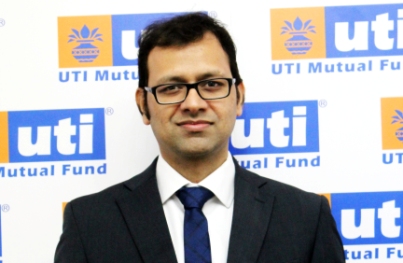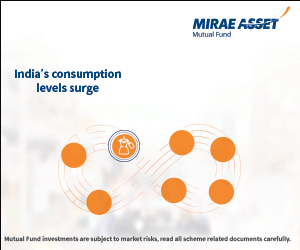Fund will endeavour to invest in companies that have scalable business models
BFSI Industry Interview

Mr. Ankit Agarwal joined UTI in August 2019. Presently he has been designated as Fund Manager; managing UTI Mid Cap Fund. He has more than 12 years of experience. Prior to joining UTI he was working with Lehman Brothers, Barclays Wealth and had been associated with Centrum Broking Ltd. also in the capacity of Sr. Vice President. He has done his graduation from National Institute of Technology (B. Tech.) and holds a post graduate degree in Management (PGDM) from IIM, Bangalore.
You are launching a small cap fund. For the benefit of retail investors and IFAs please describe the salient features of this fund?
UTI Small Cap Fund invests a minimum of 65% of the fund’s corpus in equity & equity related instruments of small-cap companies. The Fundwill endeavour to invest in companies that have scalable business models, are run by seasoned management and generate high return on invested capital. We also look to add companies that are otherwise good businesses but are currently going through a phase of cyclical downturn and where the valuations can mean revert once the cycle reverses.The Fund would pursue a pure bottom-up approach for stock picking, therefore agnostic to sectors and would maintain a well-diversified portfolio in order to mitigate company specific risks and also reduce liquidity risks in the portfolio. UTI Small Cap Fund is also a true-to-label fund and hence would not be looking to invest in large caps at the point of investment. The fund benefits from the long-track record of UTI’s strong research processes and experienced investment team.
Small caps underperformed large caps and midcaps in 2018, 2019 and first half of CY 2020. Do you think small caps are now attractive for investors with long investment horizons?
Small-cap index is currently trading close to its longer term averages on a P/B multiple and is in a favourable zone if we look at dividend yield as a valuation metric. Moreover, on a 3 year and 5 year rolling basis the index returns (small cap) we are closer to the bottoms we have seen historically over the last couple of decades and this is post the recent rally seen in smallcaps. While, downward market movement can be adverse for a smallcap fund, in upward market trend lead by a broader economic recovery the small caps tend to outperform. A benign interest rate environment, coupled with easier liquidity available to the small and midcap space, the case for smallcaps becomes stronger as the marginal benefit to them is higher. Also, smallcaps are under-owned among institutions, as they are under-researched, therefore with focused research efforts within the smallcap space one can find good quality businesses that are reasonably valuedand hence, may have potential for sharp outperformance especially in the periods of economic revival.
Some investors may be concerned about near term impact of COVID on small cap earnings relative to large and midcaps. What are your views?
We have seen maximum damage to the broader economy in Q1FY21 and every successive quarter we have seen improvement in macro data. Moreover, the listed organized space even in the small cap segment has gained market share away from the unorganized or weaker players. The competitive intensity in general has reduced and as long you pick the right companies that are leaders in their own segment they would behave akin to large caps – i.e. have lean balance sheets, have better access to capital and would gain market share. Stock picking in the sectors is thus paramount and hence a strong research and investment process are important pillars of small cap investing.
Please describe your stock picking strategy and process for the small cap fund?
UTI Small Cap Fund will have a well-diversified portfolio of businesses andwill primarily focus on 3 segments for its portfolio construction. First, focuses on high and consistent growth companies with sustainable business models, long growth runway and run by seasoned managements. Second, invests in sound businesses going through a temporary weak operating business phase. Focus on undervalued opportunities that benefit from a potential mean reversion. Lastly, invests in businesses undergoing a transformational change, hence becoming a potential re-rating candidate.Pursue bottom-up stock selection approach to pick businesses with healthy financials with core focus on Return on Capital Employed (RoCE) and Operating cash flow (OCF) generation that become the bedrock of the investment strategy. The stock selection process is backed by an experienced in-house team of analysts that cover over 200 stocks in the small and midcap space.
What is your advice to investors looking to invest in small cap fund now? What should be their minimum recommended investment tenure? Can they invest in lump sum or should they be looking to invest through SIP?
Investors seeking to take advantage of higher growth potential relative to other diversified equity funds and willing to ride the underlying portfolio volatility can consider investing in this fund. Considering one’s ability of taking risk and willingness to take risk, one can look for allocation either on lump sum or staggered route (SIP/STP) for medium to long-term horizon. In order to derive benefit from an entire business cycle the investors should look to invest in the small cap fund from a 3-5 year investment horizon.
Mutual fund investments are subject to market risks, read all scheme-related documents carefully.
Recent Interviews
-
In conversation with Mr Vaibhav Shah Head Products: Business Strategy & International Business Mirae Asset Mutual Fund India
Apr 18, 2025
-
In conversation with Mr Kaustubh Sule Senior Fund Manager Fixed Income with Groww Mutual Fund
Apr 18, 2025
-
In conversation with Mr Abhishek Tiwari Chief Business Officer of PGIM India Mutual Fund
Apr 5, 2025
-
In Conversation with Mr Akhil Chaturvedi Executive Director & Chief Business Officer with Motilal Oswal Mutual Fund
Mar 26, 2025
-
In conversation with Mr Rohit Seksaria Fund Manager Equity with Sundaram Mutual Fund
Mar 7, 2025
Fund News
-
Axis Mutual Fund joins ONDC Network to Expand Access to Mutual Fund Investments
Apr 18, 2025 by Axis Mutual Fund
-
Nippon India Mutual Fund launches Nippon India Nifty 500 Quality 50 Index Fund
Apr 18, 2025 by Advisorkhoj Team
-
Nippon India Mutual Fund launches Nippon India Nifty 500 Low Volatility 50 Index Fund
Apr 18, 2025 by Advisorkhoj Team
-
RBI Monetary Policy: RBI changes policy stance and lowers rate
Apr 9, 2025 by Axis Mutual Fund
-
Kotak Mahindra Mutual Fund launches Kotak Nifty Top 10 Equal Weight Index Fund
Apr 7, 2025 by Advisorkhoj Team




